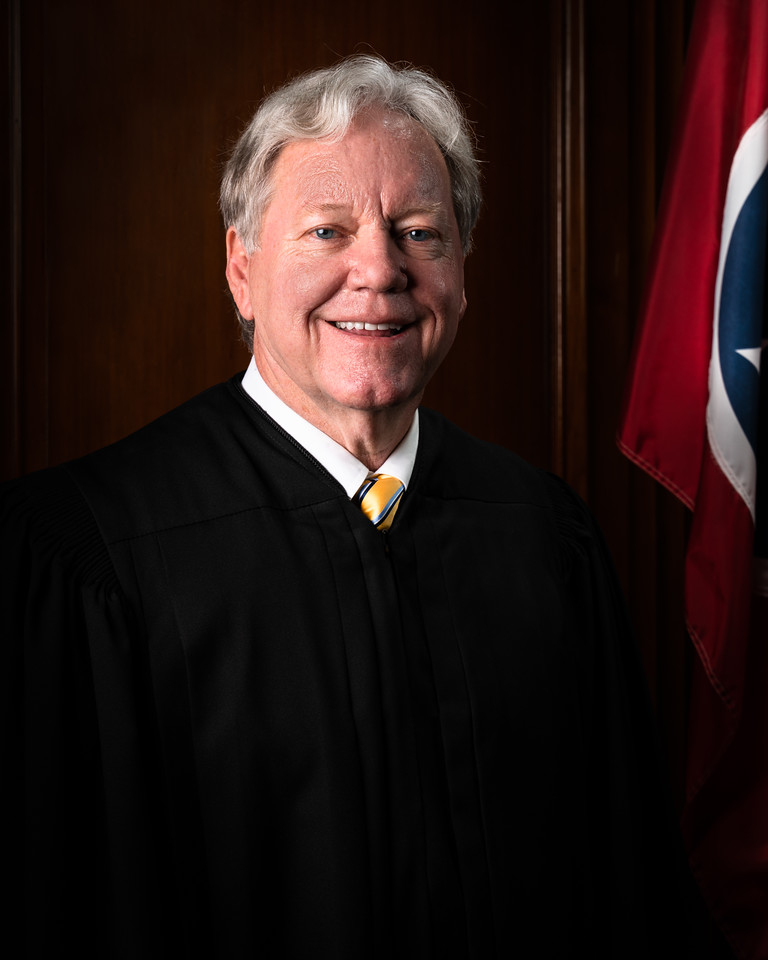Tennessee Supreme Court Justice Roger A. Page has been elected Chief Justice by his colleagues for a term that begins September 1, 2021. Justice Page succeeds Justice Jeff Bivins, who has served as chief justice since September 2016.
“It is an honor to serve as chief justice and a responsibility that I do not take lightly,” Justice Page said. “Our Supreme Court has over 100 years of judicial experience and is well-prepared to take on the serious and complex issues as the law continues to be amended and revised, to grow and evolve.”
Justice Page will be sworn-in by Justice Connie Clark in a small ceremony to be held in the courtroom he presided over in the Madison County Criminal Justice Complex on September 1 at 1:30 p.m. In order to accommodate members of the judicial family, the bar, state leaders, and policymakers, the event will be livestreamed at: https://www.youtube.com/user/TNCourts/featured.
The location and day are not without personal meaning. Justice Page was ceremoniously sworn-in as a trial judge by federal Judge Julia Smith Gibbons, for whom he clerked after law school, in the same courtroom exactly 23 years ago to the day.
“I began my judicial career in that courtroom and served the community I grew up in as a trial judge for more than thirteen years,” he said. “It means so much to be able to step back into that courtroom to take the oath as chief justice in front of my family. They have given me unconditional support every step of the way.”
Justice Page graduated from the University of Tennessee College of Pharmacy and worked as a pharmacist in Memphis before he earned his law degree from the University of Memphis, graduating fourth in his class. He began his judicial career when he was elected Circuit Court Judge in 1998 for the 26th Judicial District, which includes Chester, Henderson, and Madison counties.
He was appointed to the Court of Criminal Appeals by former Governor Bill Haslam in 2011. In 2016, Governor Haslam appointed him to the Supreme Court. For the first time in thirty years, a rural West Tennessean will serve as chief justice.
Justice Page was raised on the family farm in Mifflin, Chester County, Tennessee, with West Tennessee roots going back seven generations. His mother and his aunt will join his wife, retired Chancellor Carol McCoy, and two sons and their spouses for the swearing-in ceremony. He also has three grandchildren with another one expected in January 2022.
“The Supreme Court serves the entire State, and the judiciary significantly reflects the diverse collection of viewpoints, backgrounds, and perspectives at all levels of justice,” Justice Page said. “From big cities and urban neighborhoods to sprawling suburbs to rural farms, small river towns, and communities settled atop mountain ridges, our State encompasses all views.”
Across the state, the court system is still responding to and recovering from the pandemic, during which jury trials were postponed. On a positive note, judges and their court staff quickly adopted new technologies to ensure courts always remained open and accessible and that cases moved forward as much as possible. New and expanding technologies, together with strategies to increase the use of senior and retired judges as well as alternative dispute resolution, have provided judges with an array of resources.
Justice Page will continue to emphasize the Supreme Court’s prized Access to Justice initiative. It focuses on civil actions when litigants do not have the right to an attorney and is critical to the state’s economic growth and the personal stability of its citizens.
“Courts need to be open, fair, efficient, and accessible to everyone in our state,” Justice Page said. “We have made strides by shoring up the guardian ad litem program and creating the appellate public defender’s office, but there is more work to be done. The equitable, effective, and professional administration of justice benefits everyone from litigants to victims to defendants to taxpayers to communities. Our present opportunity to invest in efficient changes will promote a positive effect on generations to come.”
Expanding access to the courts in rural communities is an issue Justice Page will stress during his term as Chief Justice. One aspect of Access to Justice is expanding high speed internet access into all rural counties of the State. Justice Page supports judicial efficiency and recognizes that Governor Bill Lee’s efforts in that area will allow courts to expand remote hearings and e-filing, allowing every citizen in the State to have equal access and participation in the judicial system.
“Chief Justice Bivins did a tremendous job leading the Supreme Court and the judiciary,” Justice Page said. “It was extremely challenging at times, and he rose to the occasion, providing clear direction and effective and innovative solutions. While there is uncertainty about where we are headed, I am confident we have a solid blueprint to work with going forward.”

